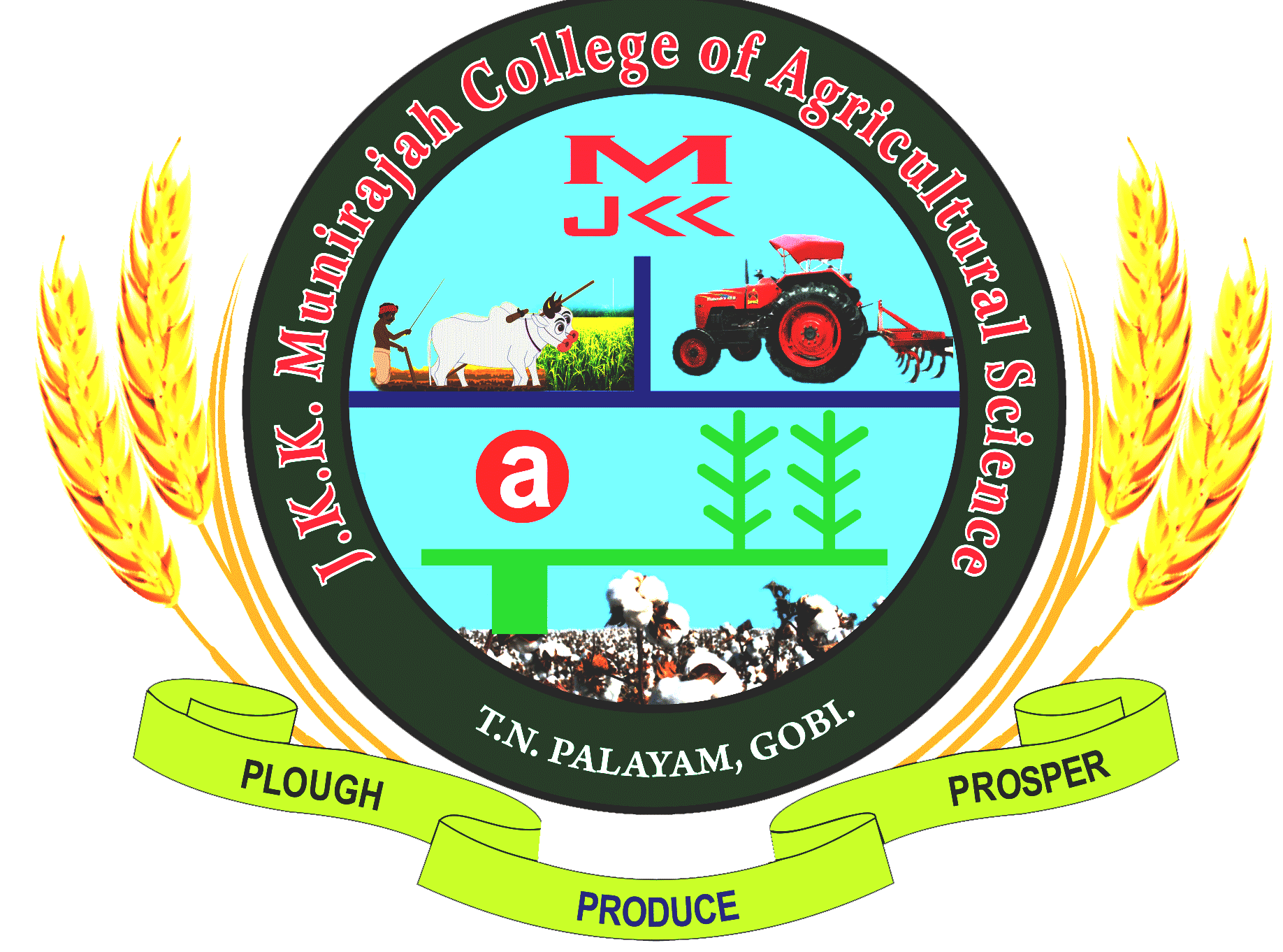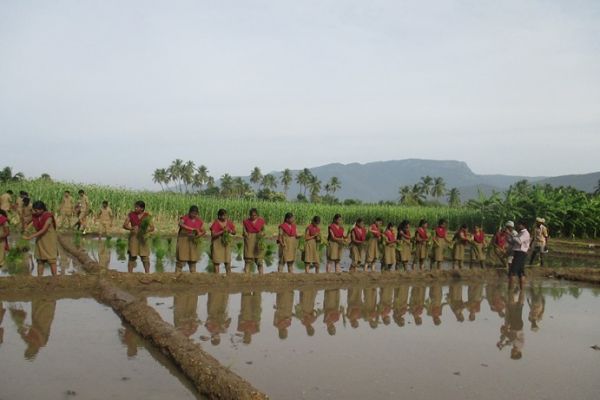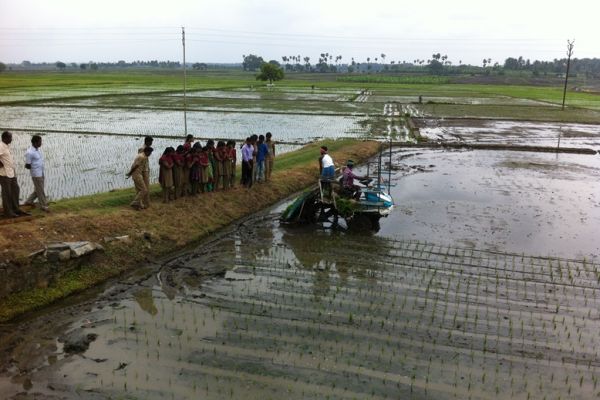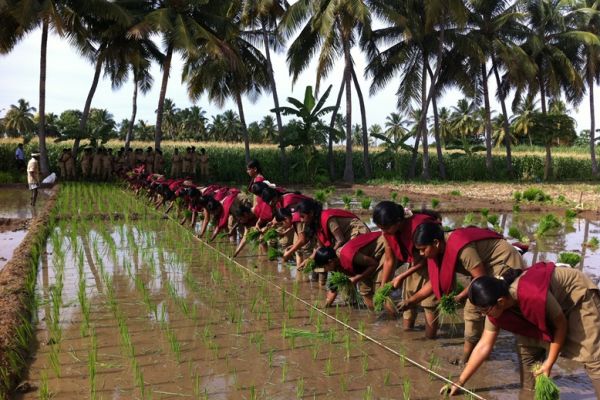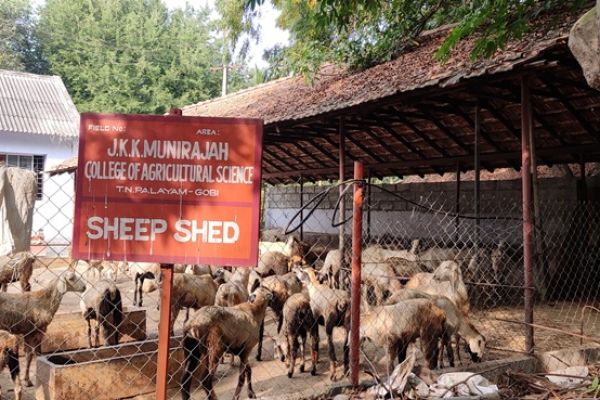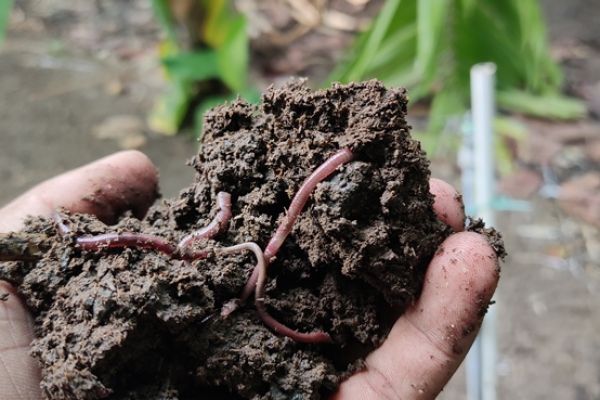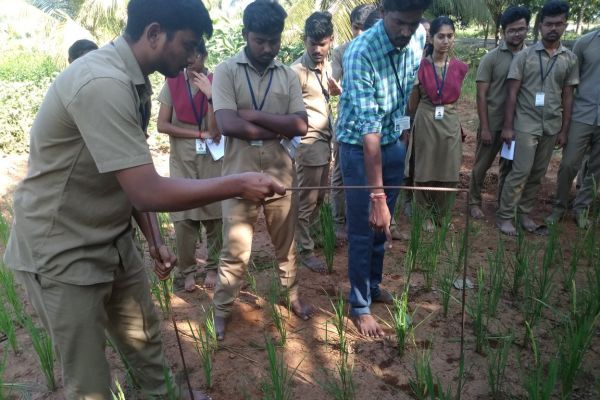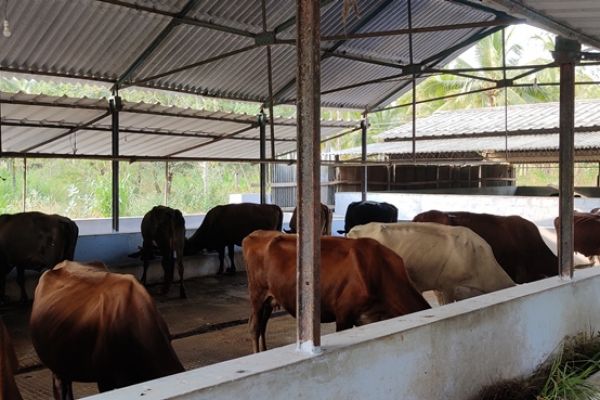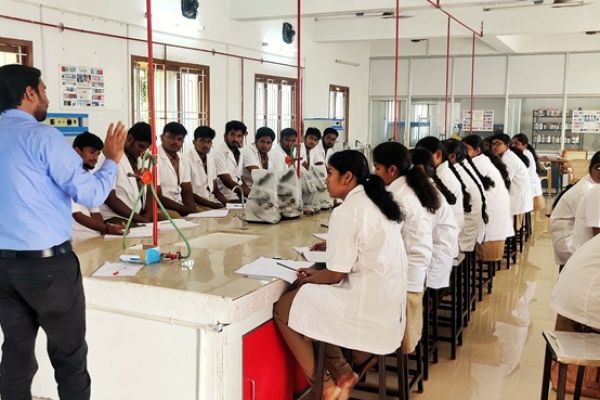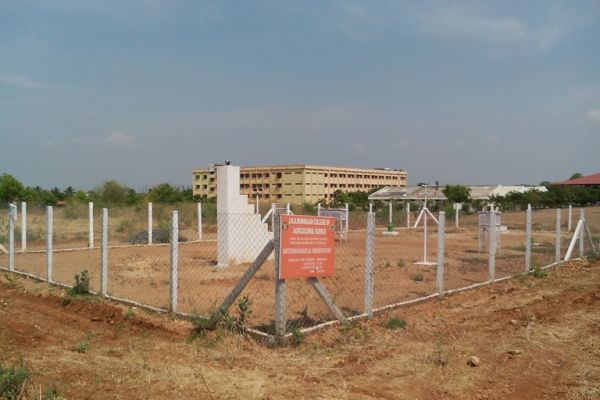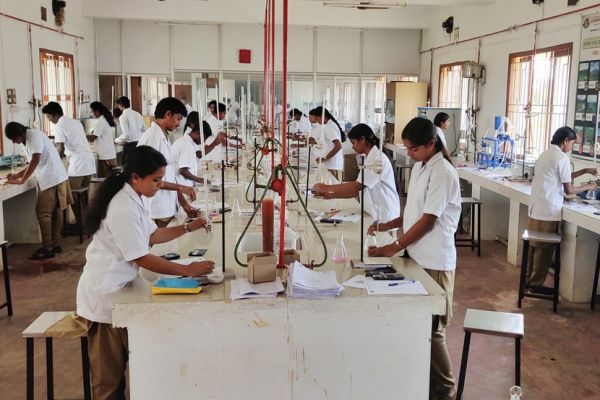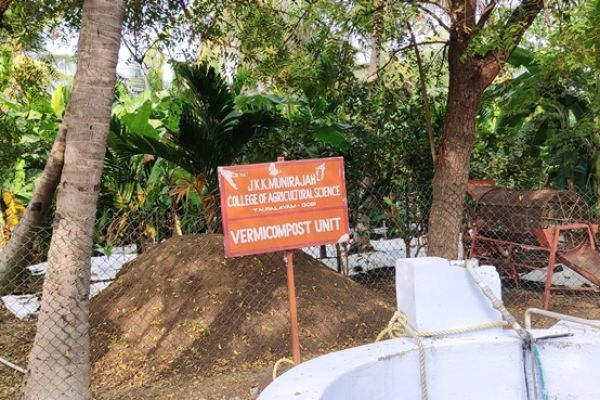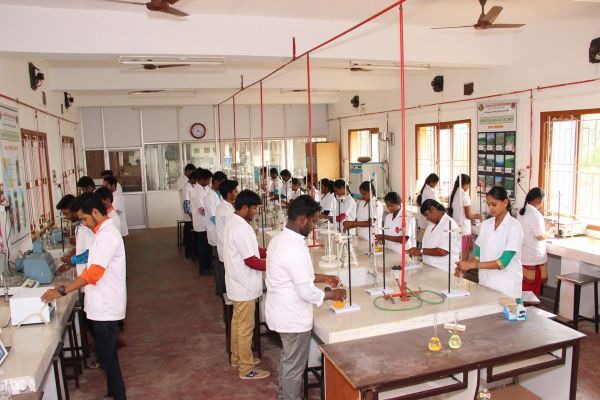Crop management begins with sowing of seeds which continues with crop maintenance during growth and development, and ends with crop harvest, storage, and distribution. Crop management techniques enable better farm economy by elevating the utilization of land, water and nutrients with improved efficiency. The department of Crop Management in JKKMCAS involves in the teaching of different crop management strategies to the under graduate students with laboratory analysis and farm management.
The department consists of
- Agronomy
- Soil Science and Agricultural Chemistry
- Agricultural Microbiology
- Animal Husbandry
- Crop Physiology
- Environmental Sciences
- Biochemistry
- Agricultural Engineering
Agronomy
Courses Offered:
| S.NO | COURSE CODE | TITLE | CREDIT HOURS |
| 01 | AGR 101 | Fundamentals of Agronomy and Agricultural Heritage | 1+1 |
| 02 | AGR 102 | Introductory Agro-meteorology & Climate Change | 1+1 |
| 03 | AGR 201 | Crop Production Technology – I (Kharif crops) | 1+1 |
| 04 | AGR 204 | Farming System & Sustainable Agriculture | 1+1 |
| 05 | AGR 202 | Study Tour Non Gradial compulsory | 0+1* |
| 06 | AGR 203 | Crop Production Technology – II (Rabi crops) | 1+1 |
| 07 | AGR 301 | Practical Crop Production - I (Kharif crops) | 0+2 |
| 08 | AGR 302 | Rainfed Agriculture & Watershed Management | 1+1 |
| 09 | AGR 303 | Practical Crop Production - II (Rabi crops) | 0+2 |
| 10 | AGR 304 | Principles of Organic Farming | 1+1 |
Soil Science and Agricultural Chemistry
Soils are the heart of the terrestrial ecosystems. An understanding of the soil system is therefore key to the success and environmental harmony of any human endeavor on the land. – Ray R. Weil
“No life on the earth without Soil”. The department caters the urge and needs of soil in perspective of cultivation and conservation in young undergraduate students of JKKMCAS; and it covers area in the spectrum of sciences deals with fundamentals, soil resource inventory, soil fertility, remote sensing and management of problematic soils throughout the course curriculum of B.Sc. (Hons.) Agriculture.
Courses Offered:
| S.NO | COURSE CODE | TITLE | CREDIT HOURS |
| 01 | SAC 101 | Fundamentals of Soil Science | 2+1 |
| 02 | SAC 201 | Soil Resource Inventory | 1+1 |
| 03 | SAC 202 | Problematic Soils and Their Management | 2+0 |
| 04 | SCA 301 | Manures, Fertilizers and Soil Fertility Management | 2+1 |
Agricultural Microbiology
Agricultural Microbiology is a branch of agriculture dealing with plant-associated microbes and plant diseases. Agricultural microbiology is a scientific discipline oriented towards the soil fertility, such as microbial degradation of organic matter and soil nutrient transformations for the exploitation of microbial resources in the main frame of agricultural and agro-industrial processes. The knowledge of microbial pathogens will lead to tools for surveillance and disease prevention. Beneficial microbes may find uses in agriculture as biofertilizers, phytostimulators, bioherbicides, biopesticides, bioremediators etc. Complex interactions among microbes and agricultural systems must be better understood to facilitate the optimal use of beneficial microorganisms and maximal control of pathogens. In the department of agricultural microbiology in JKKMCAS, attempts will be made to give an in depth knowledge pertaining to sustainable use of microorganisms as a valuable tool in agriculture.
Courses Offered:
| S.NO | COURSE CODE | TITLE | CREDIT HOURS |
| 01 | AGM 201 | Fundamentals of Microbiology | 2+1 |
| 02 | SAC 301 | Soil and Applied Microbiology | 1+1 |
Animal Husbandry
Animal Husbandry is a vital component of agriculture and rural economy. It plays a significant role in the livelihood of rural India. Promotion of knowledge on animal husbandry leads to more scientific and integrated farm management to obtain sustainable yield. It is an inseparable component of agro-forestry and agriculture to ensure the food security of the nation. Incorporating animal husbandry with agriculture further has its scope in reducing the cost of investment and together they yield greater productivity. It also assures creation of employment to the rural women, which greatly contributes towards the women empowerment.
Courses Offered:
| S.NO | COURSE CODE | TITLE | CREDIT HOURS |
| 01 | AMP 201 | Livestock and Poultry Management | 2+1 |
Crop Physiology
Crop Physiology is the basic and also applied Science. It includes the study of all the internal activities of plants those chemical and physical processes associated with life of plants. Physio means functions and logy means, study of all the functions of a living plant. Fundamental process such as photosynthesis, respiration, plant nutrition, plant hormone functions, tropisms, nastic movements, Photoperiodism, photomorphogenesis, environmental stress physiology, seed germination, dormancy and stomata function and transpiration, both parts of plants water relations are studied by crop physiologists. All applied sciences depends on crop physiology for information about how crops grow, develop and respond.
Courses Offered:
| S.NO | COURSE CODE | TITLE | CREDIT HOURS |
| 01 | CRP 101 | Fundamentals of Crop Physiology | 2+1 |
Environmental Sciences
Environmental science is a field that deals with the study of interaction between human systems and natural systems. Nowadays, environmental and sustainability issues are of great importance. The study of environmental science includes the climate change, natural resources, energy, pollution, and environmental issues. Scientific research is constantly enriched by new envisioning approaches in agriculture and forestry. Hence the demand for experts in agricultural and environmental sciences is high
Courses Offered:
| S.NO | COURSE CODE | TITLE | CREDIT HOURS |
| 01 | ENS 201 | Environmental Studies & Disaster Management | 2+1 |
| 01 | ENS 301 | Environmental Pollution and Management | 1+1 |
Biochemistry
In agriculture, biochemistry plays a valuable role in farming, fishery, poultry, sericulture, beekeeping etc., It helps in prevention of disease, an idea for increase the plant growth, enhance the yield and find the adulteration in food material.
Courses Offered:
| S.NO | COURSE CODE | TITLE | CREDIT HOURS |
| 01 | BIC 101 | Fundamentals of Plant Biochemistry | 2+1 |
Agricultural Engineering
Agricultural Engineering is the area of engineering concerned with the design, construction and improvement of farming equipment and machinery. Agricultural engineering integrates the technology with farming. Agricultural engineers apply their knowledge of engineering technology and biological science to design agricultural machinery, equipment and structures. Agricultural engineering includes design of agricultural machinery, equipment, and agricultural structures, agricultural resource management, surveying and land profiling, soil management and conservation and food engineering and processing of agricultural products.
Courses Offered:
| S.NO | COURSE CODE | TITLE | CREDIT HOURS |
| 01 | SWE 101 | Soil and Water Conservation Engineering | 2+1 |
| 02 | ERG 211 | Renewable Energy | 1+0 |
| 03 | APE 311 | Post-Harvest and Food Engineering | 1+1 |
| 04 | FMP 111 | Farm Machinery and Power | 1+1 |

